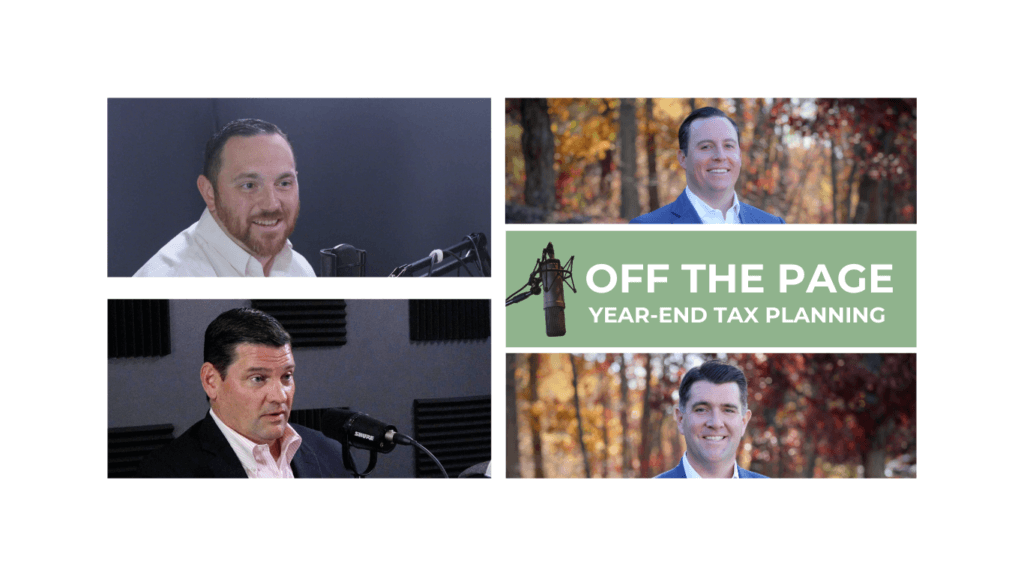
Off the Page- Year-end Tax Planning with Brian Kelly and Allan Karaffa
LegacyDec 04, 2025
As we enter the busy month of December, we want to highlight some important steps you can take now to be better prepared for tax time in the spring. While taxes might not be the most exciting subject for most of us, being better informed can significantly reduce stress—and your tax bill. As Ben Franklin famously said, “In this world, nothing is certain except death and taxes.”
Last December, members of our team sat down with two tax experts—Brian Kelly of Brian Kelly & Associates and Allan Karaffa of Kronick Kalada & Berdy. Both are experienced CPAs who work closely with clients on tax-related matters. Durning an episode of Off the Page, we asked them questions about how both business owners and individuals can be proactive and avoid surprises at tax time. A big thanks to Brian and Allan for joining us—it was a fantastic conversation packed with valuable insights.
Additional ideas for you to consider before year end:
Tax Loss Harvesting
Simply put, tax loss harvesting is taking losses to offset capital gains and lower your tax bill. There may be some losers in the portfolio that can potentially be used strategically. It is a lot more complex than it sounds. If you are taking a loss in a fund and buying another fund, you have to make sure that it is not an “identical” fund. You can’t buy the same holding back for 30 calendar days or the loss is not realized. You also have to understand that only $3,000 can be used against earned income. If your losses exceed your gains plus $3,000, then you can carry the loss forward and use it in future years. We would strongly recommend that you consult with a professional before you employ this strategy.
Roth Conversion
Just like the tax loss harvesting, a Roth Conversion is not that simple. The tax bill can still be substantial. You have to do some planning and determine what tax rate you would pay on the conversion if it moves you into a higher tax bracket. Most importantly, you have to be comfortable that investing in the taxes now will pay off in the long run. We wrote an article that goes into more detail about a Roth IRA. You can find that article by clicking here. Again, we would recommend consulting with a professional before taking any action.
Charitable Donations
There are two investment related charitable giving strategies we’ll focus on here. One is to donate highly appreciated stock. You can take the tax deduction on the donation and not pay taxes on the gains. Some conditions and limits apply and may want to consider working with an advisor to use a donor-advised fund, or DAF.
If you are over the age of 73 and are taking required withdrawals from your IRA that you don’t need, you can donate those directly to a charity and avoid paying the taxes on the distribution of up to $100,000. If you have a favorite charity and are fortunate enough to not need the required distributions from your IRA, this can be a very effective strategy.
Although it is not charitable, it is worth mentioning that you could gift up to $19,000 to any person without having to report it to the IRS. Married couples can give up to $38,000. Many families utilize annual gifts to transfer money to their children and grandchildren.
Required Distributions
While this isn’t really a tax saving exercise unless you employ the strategy above, it is worth checking to making sure you took your required minimum distribution for the year. If you are a beneficiary to an IRA, you have to take a required minimum distribution if you inherited the IRA before 2020 or if the person you inherited the IRA from after 2020 was taking required distributions. If you inherited an IRA (or Roth IRA) in 2020 or later, you have 10 years to empty the account. It would be prudent to put a strategy in place and start taking some withdrawals now to avoid a large taxable event in 10 years.
Retirement Account Contributions
Do you have extra money that you can add to your IRA or Roth IRA to hit the maximum contribution for the year? You technically have until the tax filing deadline to make these contributions, but it is something to think about now. Can you max out your workplace retirement plan or add a little more in the last month of the year? Maybe you are expecting a bonus and can add additional funds from there.
The limits for IRA and Roth IRA contributions are $7,000 for those under 50 and $8,000 for those that are 50 and over. For 401(k) accounts, the limits are $23,500 for those under 50 and $31,000 for those 50 and over. There is also an additional catch up contribution for people ages 60 to 63 of $3,750 bringing the total contribution limit for people in that age group to $34,750.
Estimated Tax Payments
For business owners, the final installment of your quarterly estimated tax payments is due on January 15, 2026. You are required to pay the lesser of 90% of your tax bill for the current year or 100% of your tax shown on your prior year return before this deadline to avoid a penalty. If your Adjusted Gross Income (AGI) is over $150,000, it is slightly altered. You must pay the lesser of 90% of your tax bill for the current year or 110% of the tax shown on your prior year return. It is worth checking to ensure that your payments are accurate, and you don’t need to increase your final payment.
We all need to pay our fair share in taxes even though we don’t necessarily enjoy it. It is worth exploring opportunities to manage our tax bill and make sure we aren’t paying more than we need to. As we mentioned multiple times, we would recommend that you consult with a professional before acting on any of these ideas.
Alliance Wealth Advisors, LLC (“Alliance”) is an SEC Registered investment advisory firm that is independently owned and operated. The information in this interview is provided for informational purposes only and should not be taken as investment, legal, or tax advice. Opinions expressed in this interview are subject to change without notice. It is important to remember that investments in securities involve risk, including the potential loss of principal invested. Past performance is no guarantee of future results and diversification does not guarantee a profit or protect against loss in a declining financial market. Alliance does not guarantee the suitability or potential value of any particular investment or strategy and accepts no liability for reliance on this presentation. Alliance also does not make any representations as to the accuracy, timeliness, suitability, completeness, or relevance of any information prepared by any unaffiliated third party mentioned in this communication and takes no responsibility. Our guest, Al Karaffa was not a client of Alliance Wealth Advisors and did not receive any direct compensation for this interview, and was not otherwise affiliated with Alliance. Our guest, Brian Kelly is client of Alliance Wealth Advisors and did not receive any direct compensation for this interview, and was not otherwise affiliated with Alliance. For more information regarding Alliance, please visit alliancewealthadvisors.com/legal-disclosures.


